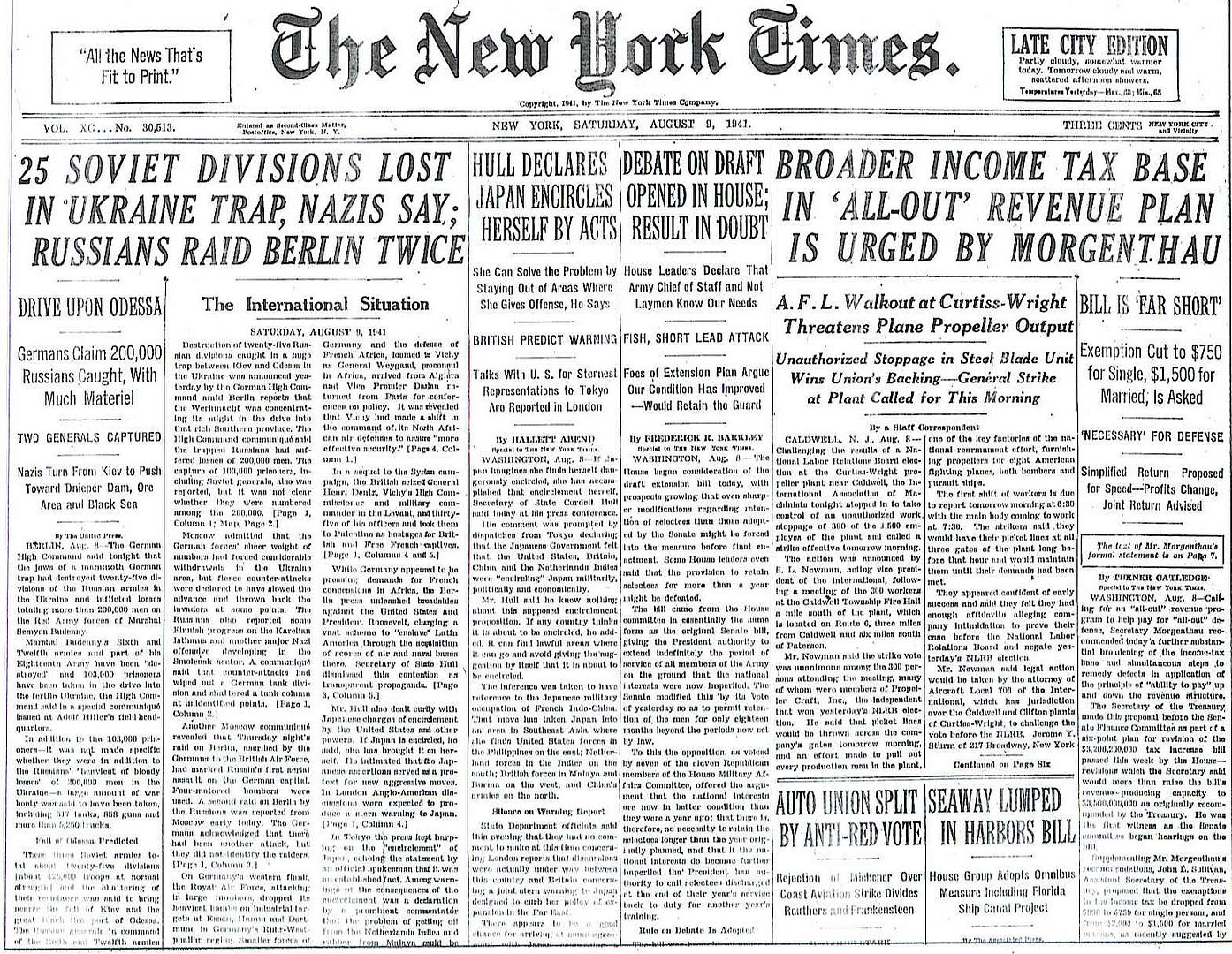
Posted on 08/09/2011 5:12:54 AM PDT by Homer_J_Simpson

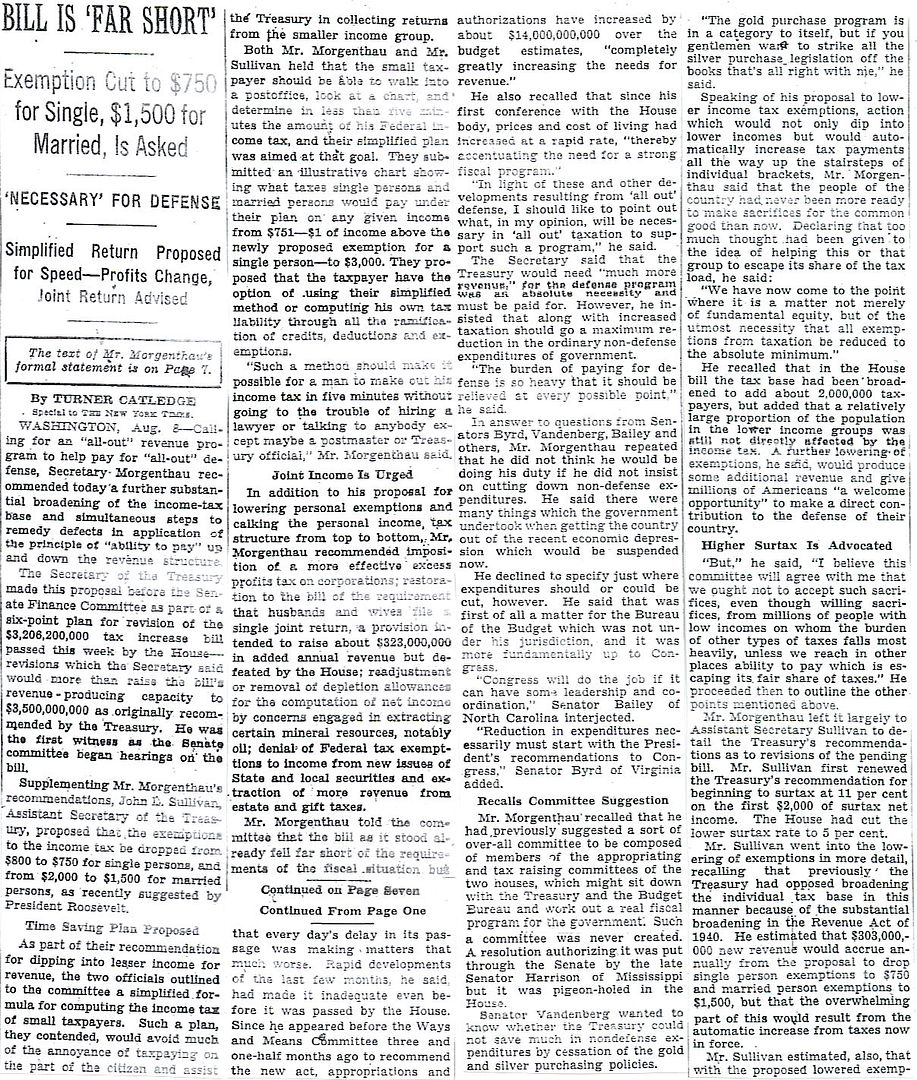
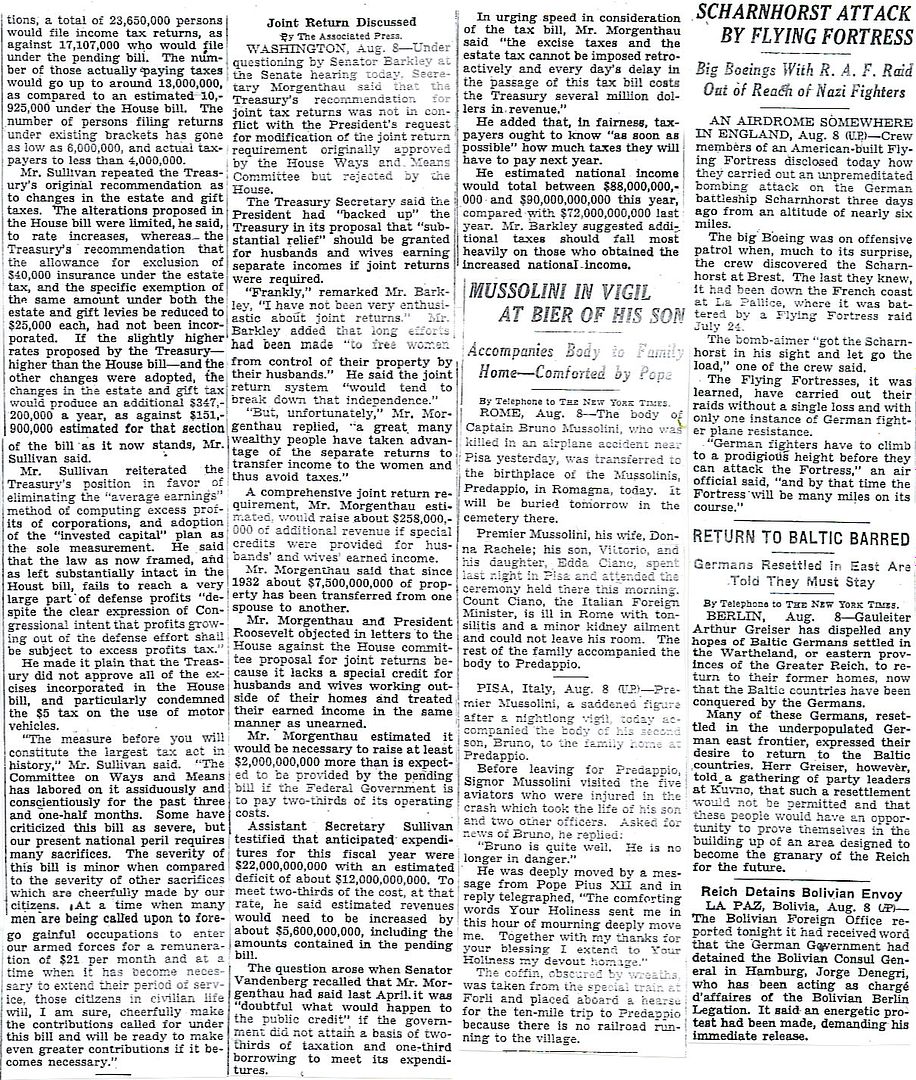
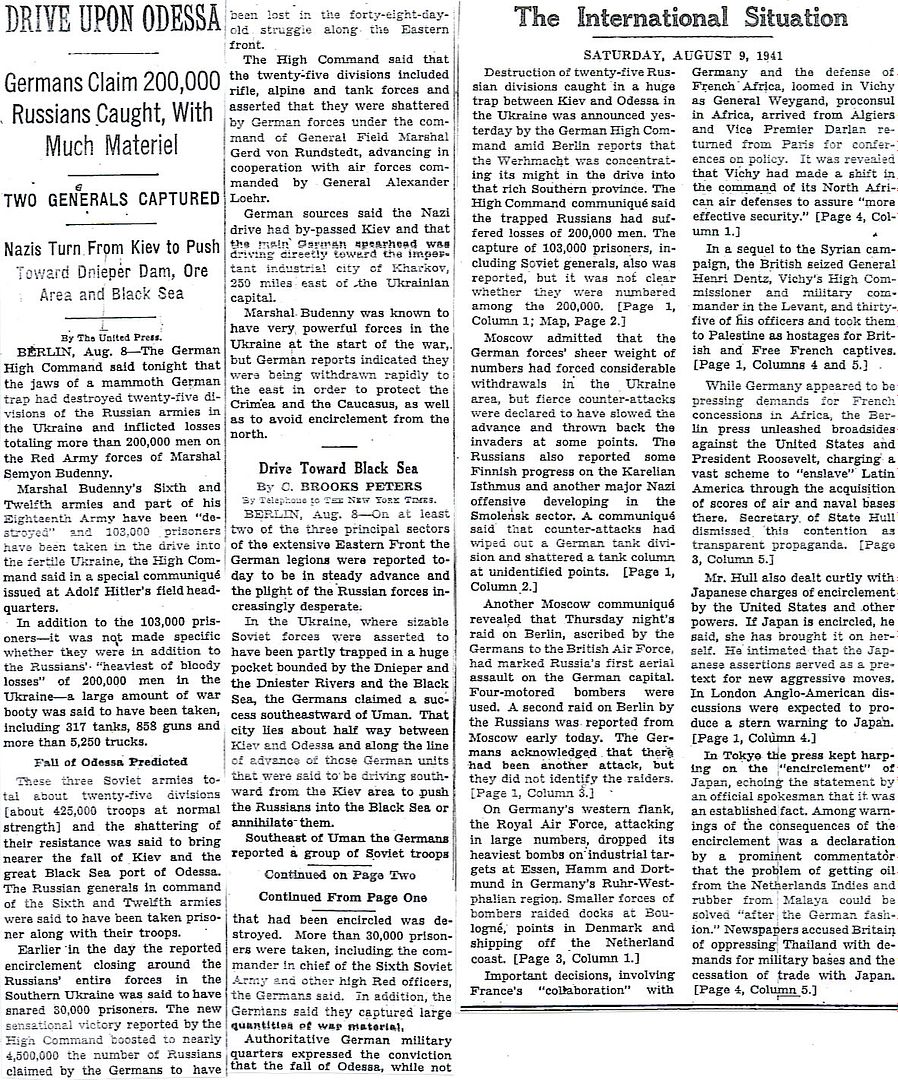
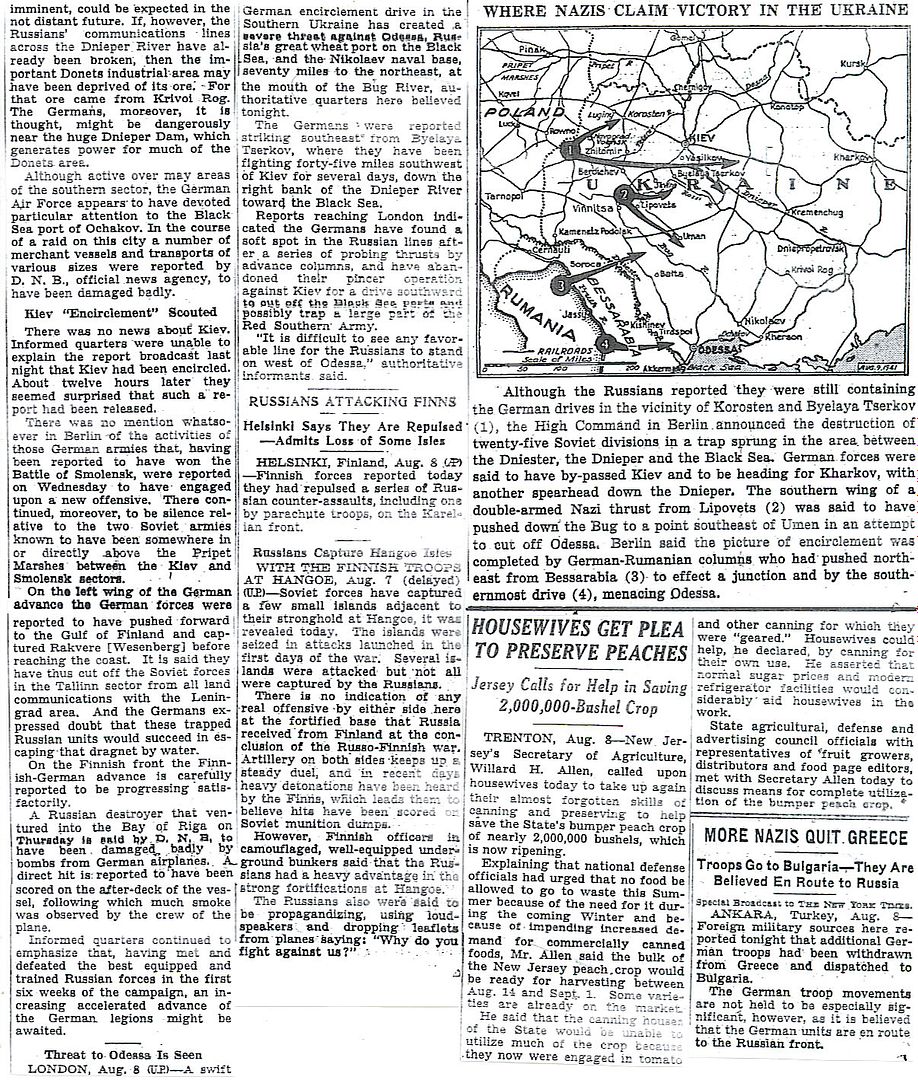
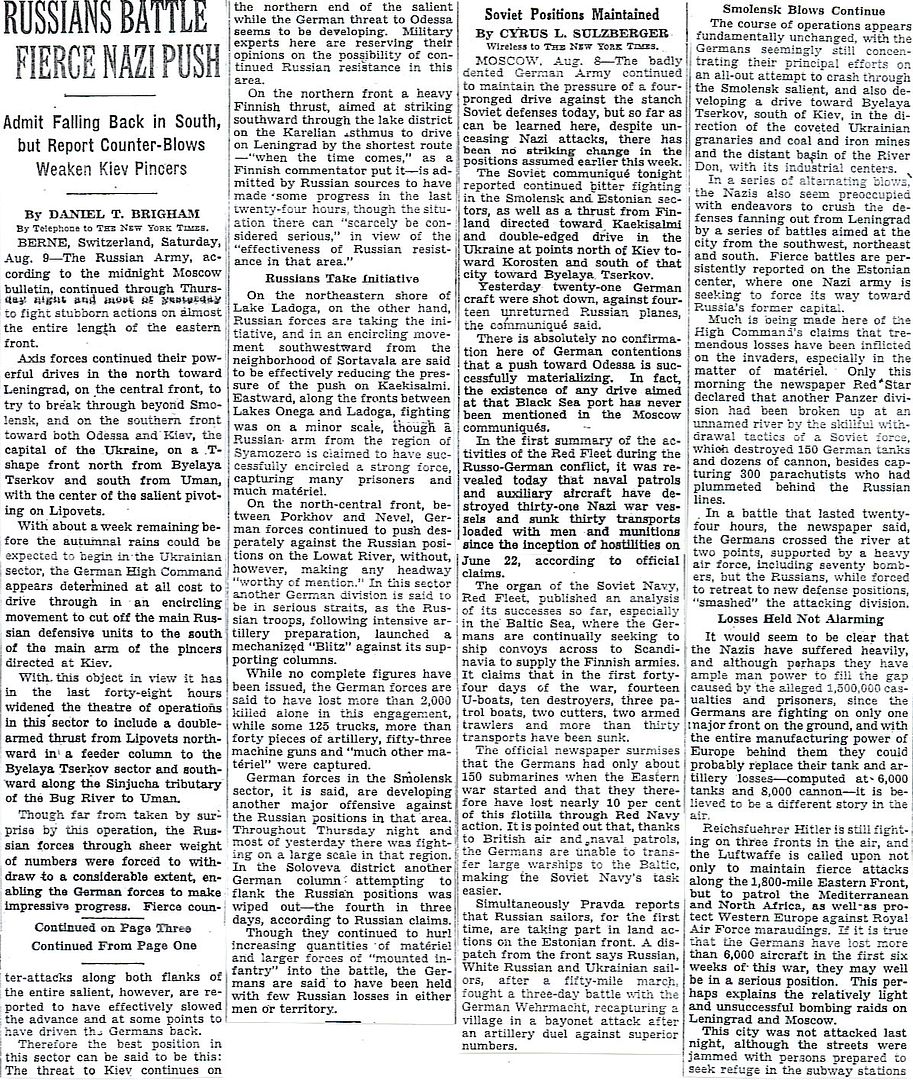
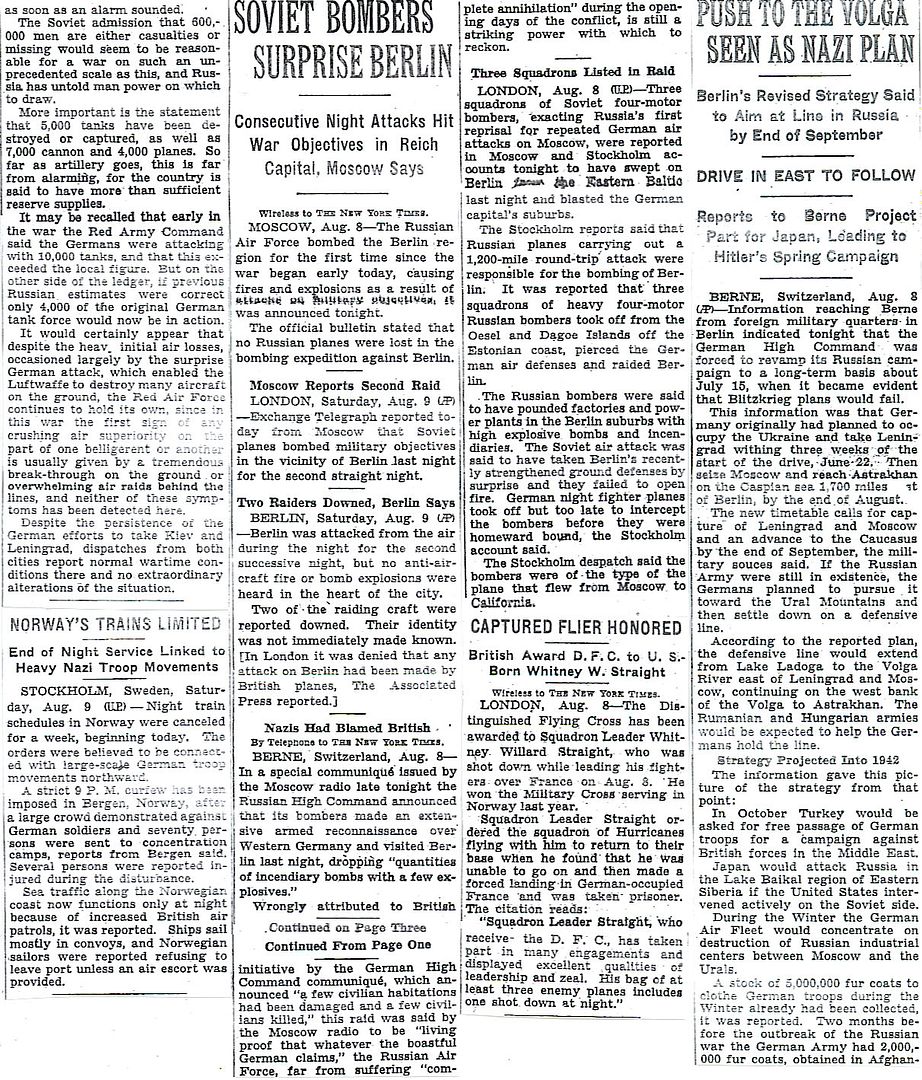
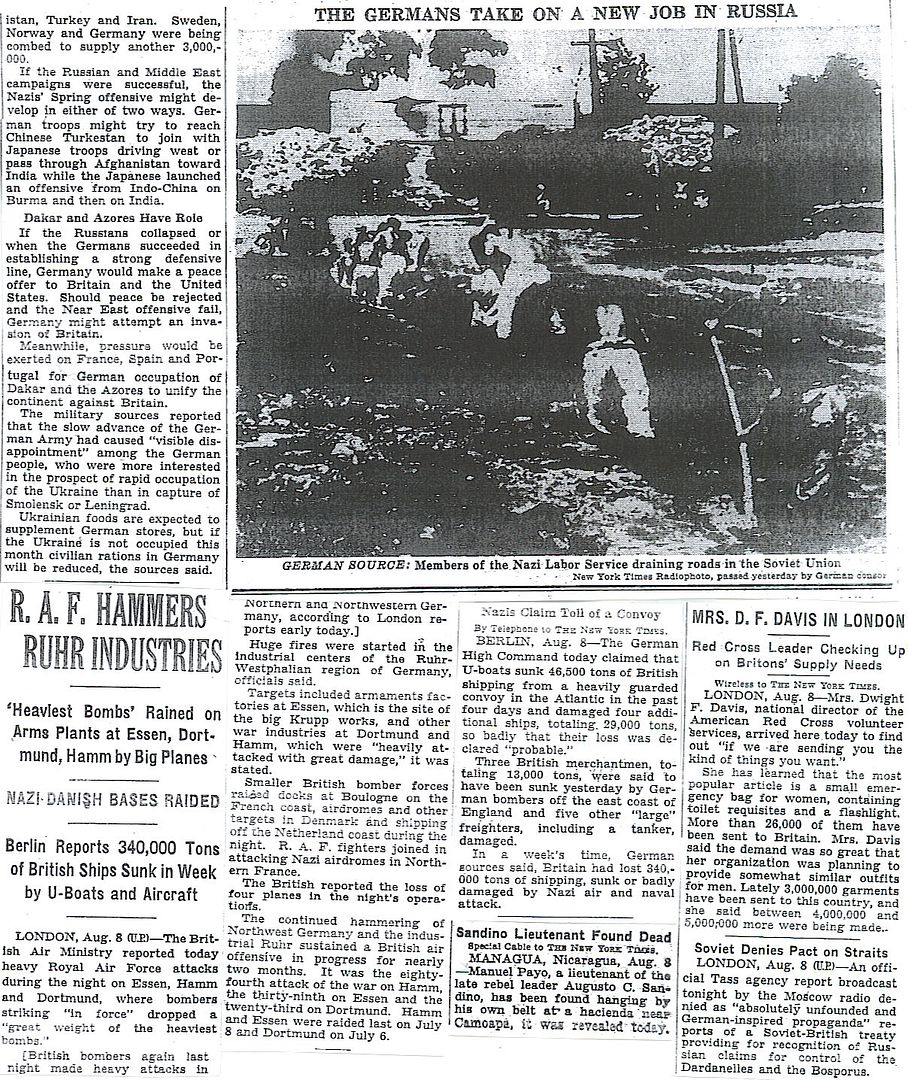
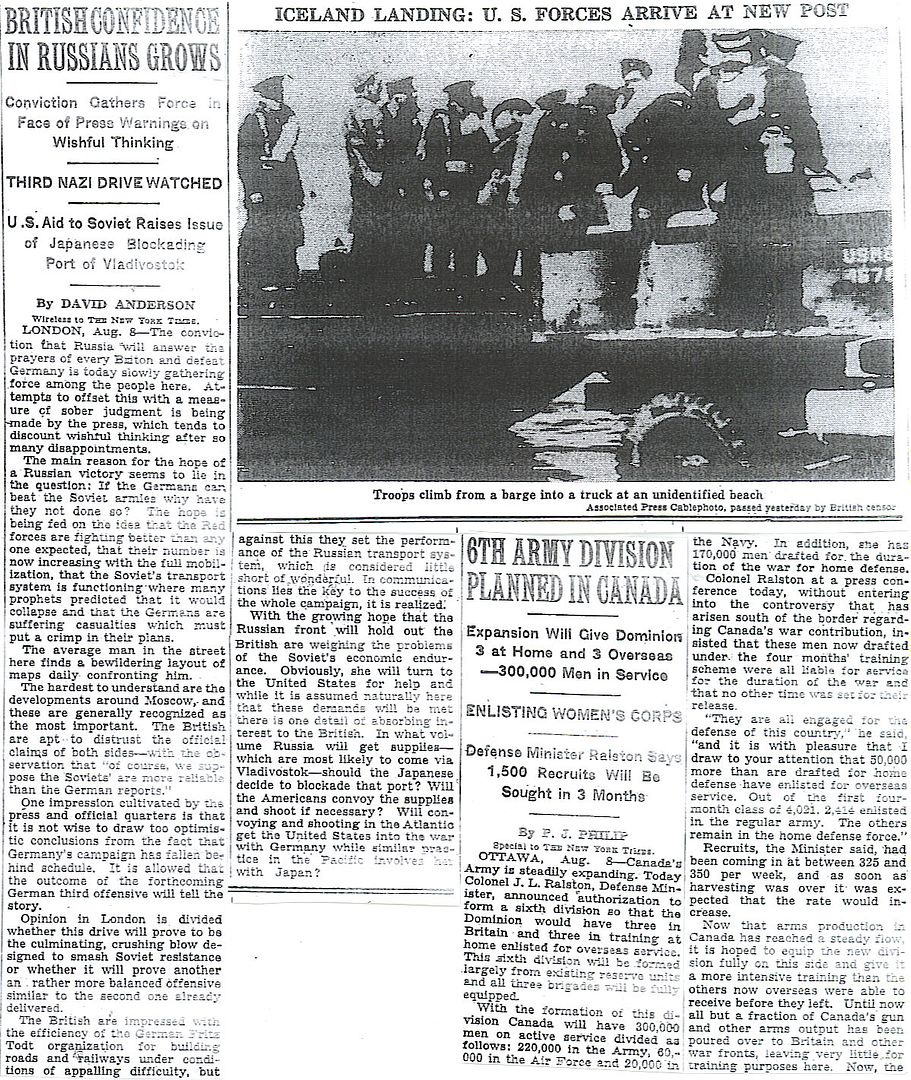
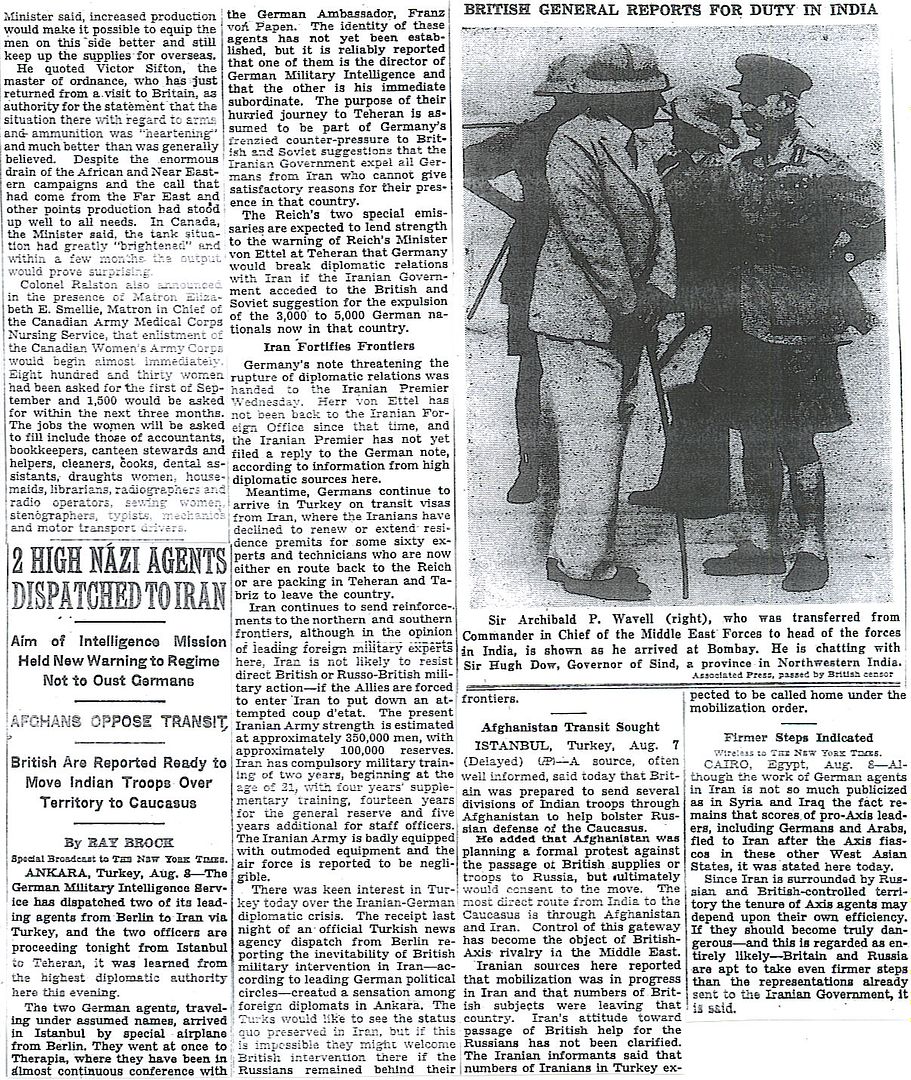
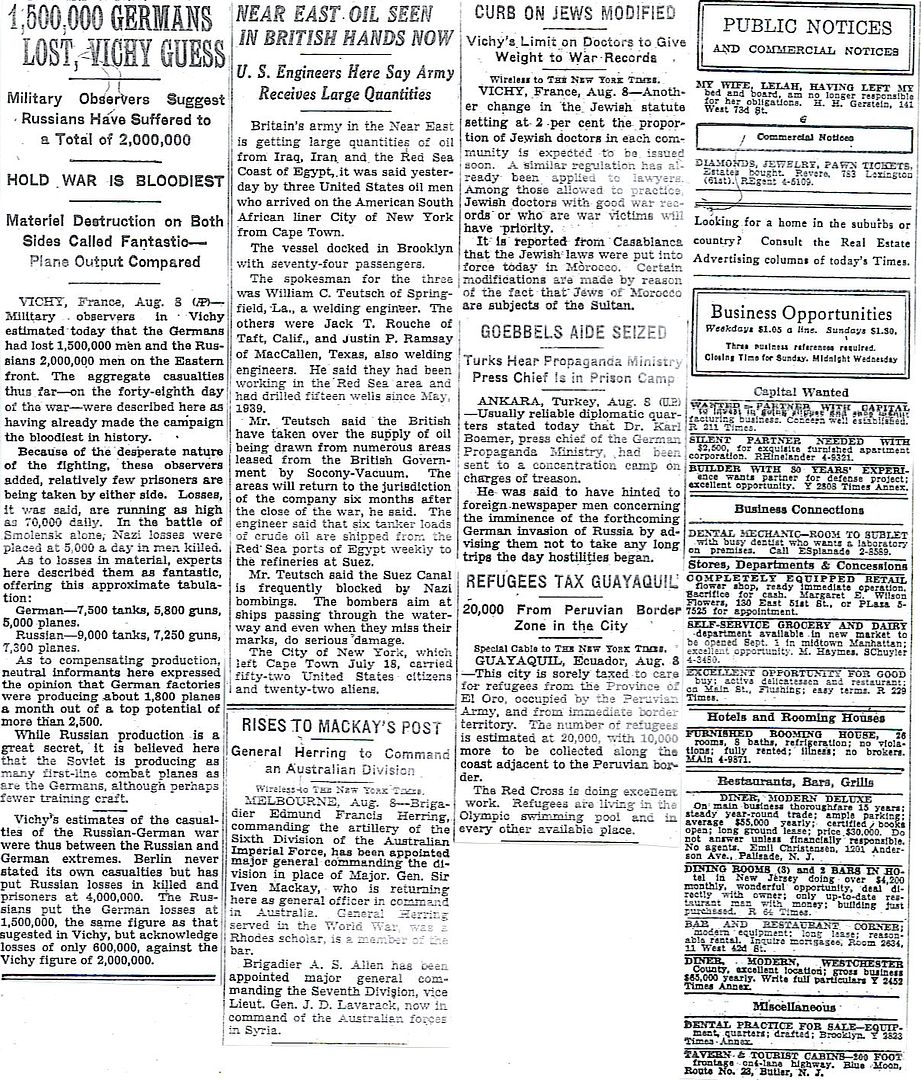
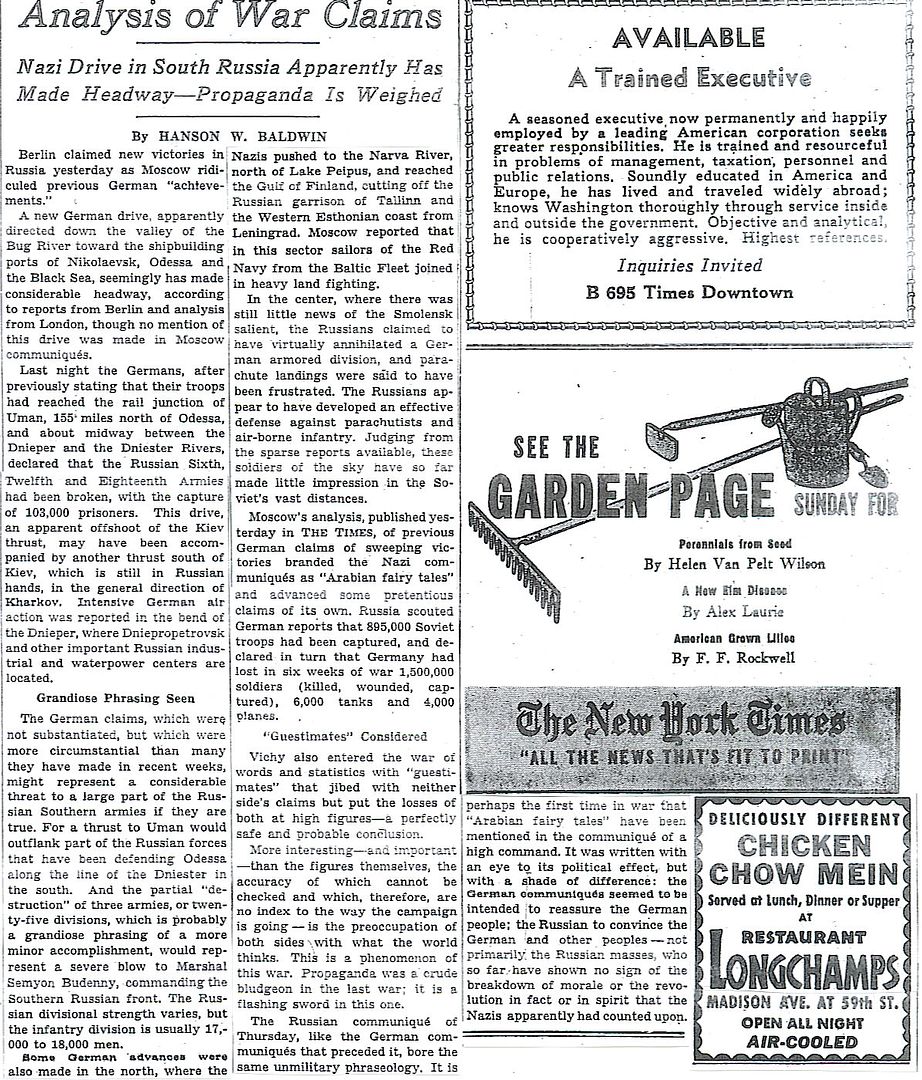
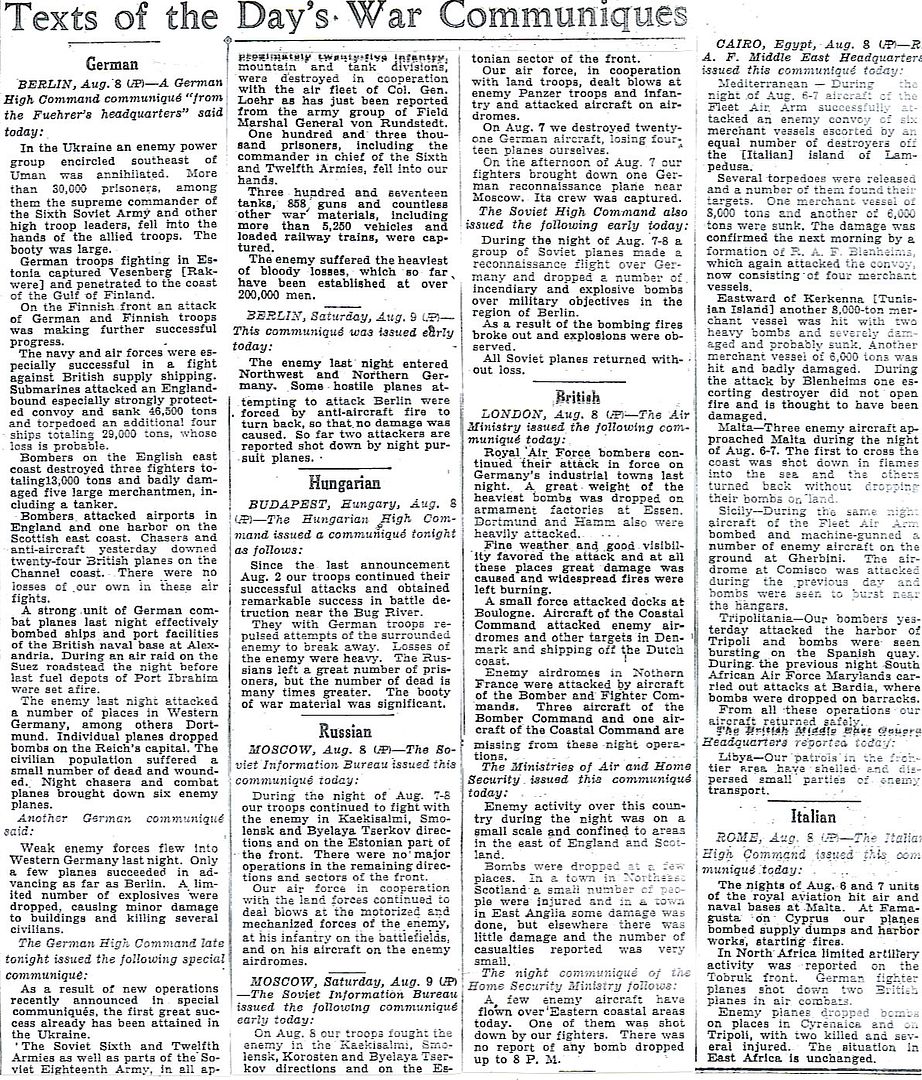
#1 - “Daddy” - Sammy Kaye, with the Kaye Choir
#2 - “Maria Elena” - Jimmy Dorsey, with Bob Eberly
#3 – “Green Eyes” - Jimmy Dorsey, with Bob Eberly and Helen O’Connell
#4 - “Yes Indeed!” - Tommy Dorsey, with Jo Stafford and Sy Oliver
#5 - “I’ll Be With You in Apple Blossom Time” – The Andrews Sisters
#6 - “Blue Champagne” – Jimmy Dorsey, with Bob Eberly
#7 – “The Hut-Sut Song” – The Four King Sisters
#8 - “Piano Concerto in B Flat” (“Tonight we Love”) - Freddy Martin, with Jack Fina
#9 - “Goodbye Dear, I’ll be Back in a Year” – Horace Heidt, with Ronnie Kemper and Donna Wood
#10 - “Til Reveille” – Bing Crosby
* Where there are no Germans.
http://www.onwar.com/chrono/1941/aug41/f09aug41.htm
Churchill meets Roosevelt in Newfoundland
Saturday, August 9, 1941 www.onwar.com
In Newfoundland... Churchill and Roosevelt begin their meeting at Placentia Bay. Both are accompanied by their military staffs. The discussions cover the situation in Europe and the Far East.
On the Eastern Front... German Army Group South, with forces from 11th and 17th Armies, begins attacks along the line of the River Bug.
http://homepage.ntlworld.com/andrew.etherington/month/thismonth/09.htm
August 9th, 1941
UNITED KINGDOM: Corvette HMS Cowslip commissioned.
Minesweeping trawler HMS Shiant launched. (Dave Shirlaw)
GERMANY: U-267 and U-360 laid down. (Dave Shirlaw)
BALTIC SEA: The German submarine U-144 is sunk in the Gulf of Finland north of Dagö, in approximate position 59N, 23E, by torpedoes from the Russian submarine SC 307. All hands on the U-boat, 28 men, are lost. (Jack McKillop)
U.S.S.R.: Army Group South begins attacks along the Bug.
Canberra: AUSTRALIA now feels increasingly vulnerable to the menace of Japan. Notwithstanding all the crippling trade embargoes imposed on Japan following its move into Indochina, the Australian government is pressing for a definite joint declaration by Britain and the United States which might halt any further Japanese encroachment into south-east Asia.
As another Australian brigade, the 27th is committed to the Far Eastern garrisons, Robert Menzies, the Australian Prime Minister, is urging Britain to warn Japan that war will result if it attacks Thailand, with the consequent threat to Singapore. He believes that the war is taking an ominous turn.
NEWFOUNDLAND: The RN battleship HMS Prince of Wales, with Prime Minister Winston Churchill aboard, arrives at Placentia Bay escorted by the RN destroyer HMS Ripley [ex USS Shubrick (DD-268)] and Royal Canadian Navy destroyers HMCS Restigouche and HMCS Assiniboine. Churchill is here to meet with U.S. President Franklin D. Roosevelt who arrived in the heavy cruiser USS Augusta (CA-31) two days ago. Churchill calls on Roosevelt on board USS Augusta and the two confer over lunch and dinner before Churchill returns to HMS Prince of Wales.
This conference will result in the Atlantic Charter; a statement of principles governing the policies of Britain and America. The other major outcome of this conference is that the military staff of both countries get to know each other and to begin to work together. This conference will last for 4 days. (Jack McKillop)
ATLANTIC OCEAN: U-206 sinks SS Ocean Victor.
Italian submarine Maggiore Baracca was rammed and sunk in the North Atlantic, NE of the Azores, in position 40.15N, 20.55W by destroyer HMS Croome. (Dave Shirlaw)
His brother Michael Straight became an underground Soviet agent in the US, FDR speechwriter and editor of The New Republic. Michael confessed to the FBI in 1963 and named Anthony Blunt as another Soviet agent.
http://www.mtholyoke.edu/acad/intrel/fdrwc.htm
“”Roosevelt and Churchill Discuss Colonial Questions”, August 10, 1941, excerpt from Elliott Roosevelt, As He Saw It (New York: Duell, Sloan and Pearce, 1946)
“Father [FDR] started it.
“Of course,” he remarked, with a sly sort of assurance, “of course, after the war, one of the preconditions of any lasting peace will have to be the greatest possible freedom of trade.”
He paused. The P.M.’s [Churchill’s] head was lowered; he was watching Father steadily, from under one eyebrow.
“No artificial barriers,” Father pursued. “As few favored economic agreements as possible. Opportunities for expansion. Markets open for healthy competition.” His eye wandered innocently around the room.
Churchill shifted in his armchair. “The British Empire trade agreements,” he began heavily, “are—”
Father broke in. “Yes. Those Empire trade agreements are a case in point. It’s because of them that the people of India and Africa, of all the colonial Near East and Far East, are still as backward as they are.”
Churchill’s neck reddened and he crouched forward. “Mr. President, England does not propose for a moment to lose its favored position among the British Do-minions. The trade that has made England great shall continue, and under conditions prescribed by England’s ministers.”
“You see,” said Father slowly, “it is along in here somewhere that there is likely to be some disagreement between you, Winston, and me.
“I am firmly of the belief that if we are to arrive at a stable peace it must involve the development of backward countries. Backward peoples. How can this be done? It can’t be done, obviously, by eighteenth-century methods. Now-”
“Who’s talking eighteenth-century methods?”
“Whichever of your ministers recommends a policy which takes wealth in raw materials out of a colonial country, but which returns nothing to the people of that country in consideration. Twentieth-century methods involve bringing industry to these colonies. Twentieth-century methods include increasing the wealth of a people by increasing their standard of living, by educating them, by bringing them sanitation-by making sure that they get a return for the raw wealth of their community.”
Around the room, all of us were leaning forward attentively. [Harry] Hopkins [a major FDR adviser] was grinning. Commander [C. R.] Thompson, Churchill’s aide, was looking glum and alarmed. The P.M. himself was beginning to look apoplectic.
“You mentioned India,” he growled.
“Yes. I can’t believe that we can fight a war against fascist slavery, and at the same time not work to free people all over the world from a backward colonial policy”
“What about the Philippines?”
“I’m glad you mentioned them. They get their independence, you know, in 1946. And they’ve gotten modern sanitation, modern education; their rate of illiteracy has gone steadily down
“There can be no tampering with the Empire’s economic agreements.”
“They’re artificial ...”
“They’re the foundation of our greatness.”
“The peace,” said Father firmly, “cannot include any continued despotism. The structure of the peace demands and will get equality of peoples. Equality of peoples involves the utmost freedom of competitive trade. . .”
It was after two in the morning when finally the British party said their good nights. I helped Father into his cabin, and sat down to smoke a last cigarette with him.
Father grunted. “A real old Tory, isn’t he? A real old Tory, of the old school.”
“I thought for a minute he was going to bust, Pop.”
“Oh,” he smiled, “I’ll be able to work with him. Don’t worry about that. We’ll get along famously.”
“So long as you keep off the subject of India.”
“Mmm, I don’t know. I think we’ll even talk some more about India, before we’re through. And Burma. And Java. And Indo-China. And Indonesia. And all the African colonies. And Egypt and Palestine. We’ll talk about ‘em all.”
“”
Thanks for a fascinating post.
It makes crystal clear the Sophie's Choice faced by Winston Churchill -- if he allies with America, Britain loses its empire, but if to save its empire, he turned & allied with Germany, Britain would lose its soul.
For that reason, and others, I place Churchill as the greatest of WWII leaders.
Good job FDR. You got England out of those places and now they are, mostly, as backward as ever. Good job. Hope you like your afterlife ‘well done’.
MAJOR EINSATZGRUPPEN MASSACRES OF JEWS, 1941-1942 (Balkans)
"Germany occupied Serbia in 1941, interned most of its 16,000 Jews, and shot or gassed most of them.
The pro-Nazi Ustasa government in Croatia interned about 30,000 Jews, most in the Jasenovac camp, where 20,000 Jews perished."
"A diagram drawn by an unidentified German soldier describes details of an Aktion at Zhitomir in the Ukraine, during which about 500 Jews were shot.
As illustrated, Jews were forced to dig a ditch and then kneel at the edge. Each would be shot in the back of the head and then fall into the ditch."
Not all of them -- some have done quite well indeed.
Indeed, some are cleaning our own clocks economically these days -- so would we be better off if they were more backwards?
And, overall, former British colonies have done better than the colonies of any other European power.
CougarGA7: "This is actually the second time you have posted the 8 items and the third time I’ve seen them posted on these threads. So much for “never actually listed”."I recently posted a barely legible photocopy of one page of McCollum's memo. The posting's purpose was not to discuss the eight-actions, but simply demonstrate that the memo is real.
CougarGA7: "I already put in my two cents on these last month. It’s just not as impressive as the conspiracy nuts want to believe it is."
It demonstrates beyond reasonable doubt the inspiration behind Roosevelt's actions toward Japan in 1941 -- the need to create "much ado" in the hopes that if "Japan could be led to commit an overt act of war, so much the better."
It shows that FDR was not acting randomly, or maneuvering to avoid war, but rather was purposely doing the opposite.
Of course, it in no way proves that FDR's inner circle knew or suspected an attack was coming on Pearl Harbor in December, 1941. But it does show that in some ways he wanted and expected some such attack.
And just so we keep things on the "fair and balanced" side -- if you are going to call me a "conspiracy nut", then I'll call you a "Pearl Harbor denier", pal. ;-)
Though I didn't call you specifically a conspiracy nut in that post, I do appreciate that you recognize that you fall into that group. Understanding you have a problem is the first step towards a remedy. As to calling me a "Pearl Harbor denier", I think that's pretty funny. I don't recall ever denying Pearl Harbor happened, but whatever makes you feel better about yourself.
Now I had actually forgotten about your posting the photocopy of the memo, so I stand corrected. You have posted McCollum's 8 point memo three times, not two. And it's been posted 4 times total.
The problems with the McCollum memo are really many. As for those who read my breakdown of the memo last month will have seen. Aside from the fact that there has never been any proof that this memo was even seen by the President, it just isn't impressive.
Three of the items on the list never happened, two were already policy, two were a logical extension of an existing policy and one happened late and clearly unrelated to any memo, but related to a shift in planning in the War Department.
So again, I don't see any proof here that FDR knew Pearl Harbor was going to get hit and allowed his fleet to get sunk.
This is the first day in a while that my notes don’t have anything in them for the day. I’m hoping by about a year from now I will have populated the program with enough material that something always comes up for the day. It does have several items for 1942 on this date.
You deny two key points:
CougarGA7:"You have posted McCollum's 8 point memo three times, not two."
Then your ability to search through previous posts is better than mine.
I've looked back through my February posts, and except for that hard-to-read photocopy, can't find where the complete list of Eight Actions was ever posted before.
CougarGA7: "Aside from the fact that there has never been any proof that this memo was even seen by the President..."
Personally, knowing how bureaucracies & military hierarchies work, I doubt seriously if Navy Commander McCollum even originated those eight actions.
I'm near certain he was told what to write by his superiors, as a result of their many conversations.
So McCollum was simply recording what FDR's inner circle was saying amongst themselves.
That means: whether FDR himself saw the memo is irrelevant, since he was the one who effectively initiated it, and carried it out.
Further, according to Stinnett, all eight items were started, and nearly all accomplished before the Pearl Harbor attack.
And the result was just what McCollum predicted: Japan was lead to commit the first overt act of war, which created enough "ado" to bring the US into the war.
CougarGA7: "Three of the items on the list never happened, two were already policy, two were a logical extension of an existing policy and one happened late and clearly unrelated to any memo, but related to a shift in planning in the War Department."
In fact, according to Stinnett, all eight actions were started before Pearl Harbor.
I refer you to chapter 2, notes 7 through 11, on pages 321 to 322 of Stinnett's paperback.
CougarGA7: "So again, I don't see any proof here that FDR knew Pearl Harbor was going to get hit and allowed his fleet to get sunk."
McCollum's memo does not even suggest, much less prove, that Japan might attack Pearl Harbor.
What it does show is that top US officials were thinking of methods to provoke the Japanese into some kind overt act, which would create enough "ado" to justify a declaration of war.
I have never said that actions taken by FDR did not provoke an attack by Japan. What I have said (even in the last post) is that there is no evidence that FDR knew that Pearl Harbor was going to get hit by the Japanese and intentionally allowed his fleet to get surprised and sunk. I have also said that there were failures all the way up the chain of command.
I know how military bureaucracies work too, and there is still no evidence that FDR ever saw this memo and there is less proof that he or any of his inner circle contracted its authorship. To make such a suggestion is just making wild suppositions. It’s really the core problem with this memo, the suppositions are so far out there that they are not even believable.
Considering the numerous problems with Stinnett’s book, I’m not very surprised that he claims all 8 were done. And, like I said, 2 of them were just a restatement of policies that were already decided before the memo was even written (not very telling). 3 of them never happened.
Overall though, its just not that incredible. Of the 5 of 8 actions that did take place, none of them are outside the realm of what would make sense considering the situation.
The full embargo, which really was a primary motivator for Japan, was just an extension of the embargos that were levied after July of 1940 when Japan occupied northern Indochina. This is why I put the question out there when it happened, what would you (general you, not specific to you) have done. If you decide to go with the full embargo, of course you are going to ask your allies to do it as well and I bet it wouldn’t take much convincing either.
Keeping the fleet in Hawaii? That was a done deal long before this memo was written. So was the commitment to help China. T.V. Soong had already brokered loans disguised as trade agreements before this memo was written and with the long standing American commitment to the Open Door policy in China, their support is really a no brainer.
Stinnett makes a reference to a obscure statement in a letter to Richardson about sending submarines to Manila dated November 1940, but in reality two divisions of submarines were not sent to Manila at that time (at most there were three individual submarines, but the Seawolf and Searaven may have already been transferred the Asiatic Fleet by October). It was not until October of 1941 as plans were changing on how much effort was going to be put into defending the Philippines (championed by MacArthur of course) that two divisions were sent, almost doubling the number of submarines assigned to the Asiatic Fleet and more than doubling their effectiveness since 6 of the subs that were already there were old S-class subs that had been there since 1924. I don’t see how this memo could have anything to do with it.
Then you are already at least 50% of a "conspiracy nut," because that is at least half of the alleged "conspiracy."
Now, if I could just get you to pay attention to the evidence about Pearl Harbor itself, then you'd be home with us, defending the truth instead of a pack of political lies. ;-)
CougarGA7: "What I have said (even in the last post) is that there is no evidence that FDR knew that Pearl Harbor was going to get hit by the Japanese and intentionally allowed his fleet to get surprised and sunk.
I have also said that there were failures all the way up the chain of command."
I too have never said, "FDR knew that Pearl Harbor was going to get hit by the Japanese and intentionally allowed his fleet to get surprised and sunk."
What I do say, and evidence fully supports, is that top leaders in Washington, including FDR, knew or suspected the coming Japanese attack on Pearl Harbor, but failed to adequately warn the Hawaii commanders, because among other screw-ups, they were ordered to insure that Japan would commit the first overt act of war.
CougarGA7: "I know how military bureaucracies work too, and there is still no evidence that FDR ever saw this memo and there is less proof that he or any of his inner circle contracted its authorship."
Then you know full well, that a memo like McCollum's never just appears out of nowhere.
There had to be many discussions, it had to be a consensus document, and the proof of that is: the endorsement by McCollum's boss, and the high officials to whom it was addressed.
These high officials met frequently with FDR, so McCollum's Eight Actions (and, no doubt, others) would have been reviewed, discussed, debated, modified and executed according to Roosevelt's intentions.
And they were all eventually executed, despite your repeated claims to the contrary.
CougarGA7: "It’s really the core problem with this memo, the suppositions are so far out there that they are not even believable."
The only "far out" suppositions I've ever seen are those by the Pearl Harbor deniers claiming that McCollum's memo does not really say exactly what it clearly does say.
CougarGA7: "Considering the numerous problems with Stinnett’s book, I’m not very surprised that he claims all 8 were done.
And, like I said, 2 of them were just a restatement of policies that were already decided before the memo was even written (not very telling).
3 of them never happened."
OK, pal, the time has come for you to put up or shut up.
Name the eight actions, one by one, and explain how each action either did not happen, or was not part of a plan to provoke the Japanese into war.
Once you have spelled out your argument in specificity, I will show you where you're wrong.
CougarGA7: "Of the 5 of 8 actions that did take place, none of them are outside the realm of what would make sense considering the situation."
Not a single one of those actions was intended to avoid war, or help negotiate peace with Japan -- just the opposite.
They were intended to cause a crisis with Japan, and they succeeded.
CougarGA7: "I put the question out there when it happened, what would you (general you, not specific to you) have done."
As I've said here frequently, I approve of everything President Roosevelt did about Japan, except his failure to more effectively warn the commanders in Hawaii.
CougarGA7: "The full embargo, which really was a primary motivator for Japan, was just an extension of the embargos that were levied after July of 1940 when Japan occupied northern Indochina."
Here is one brief description of those events:
"After Japan occupied northern French Indochina in late 1940, FDR authorized increased aid to the China, a policy that won widespread popular support.
In July 1941, after Japan occupied the remainder of Indo-China, he cut off the sale of oil to Japan.
Japan thus lost more than 95 percent of its oil supply.
Roosevelt continued negotiations with the Japanese government, primarily through Secretary Hull.
Japan Premier Konoye desired a Pacific conference with FDR which U.S. Ambassador Joseph Grew favored but which Hull opposed.
When Kenoye failed to produce diplomatic results, Emperor Hirohito replaced him with Minister of War Tojo.
Meanwhile Roosevelt started shifting the long-range B-17 bomber force to the Philippines."
The important point here is that McCollum's Eight Action Plan, dated October 7, 1940, was contemporary with Japan's move into Indo-China, and President Roosevelt's authorization of increased aid to China.
CougarGA7: "Keeping the fleet in Hawaii? That was a done deal long before this memo was written."
In fact, the President's decision to fire Admiral Richardson for Richardson's opposition to keeping the US fleet in Hawaii was made after McCollum's memo was typed up.
So, McCollum's plan helped support FDR's policy, and suggested other ways to accomplish their goal.
CougarGA7: "So was the commitment to help China. T.V. Soong had already brokered loans disguised as trade agreements..."
Which goes to prove, yet again, that McCollum's memo only reflected the thinking already in place, and was not proposing radically new ideas.
CougarGA7: "It was not until October of 1941 as plans were changing on how much effort was going to be put into defending the Philippines (championed by MacArthur of course) that two divisions were sent, almost doubling the number of submarines assigned to the Asiatic Fleet..."
Remember, McCollum was a lowly Commander in Naval Intelligence -- he in no way could tell his bosses, much less the Commander in Chief, FDR, what to do.
So all his memo does is provide suggestions for how to accomplish the goals his CinC has laid out -- to provoke the Japanese into a first overt act of war.
Roosevelt alone made decisions on if or when to implement McCollum's action items.
But the bottom line is, FDR did eventually implement all eight actions, and they did accomplish the goals McCollum and Roosevelt intended.
CougarGA7: "I don’t see how this memo could have anything to do with it."
McCollum's memo simply reflected the thinking of FDR's inner circle at the time it was written -- in late September and early October, 1940.
And there is no evidence -- zero, zip, nada -- that this thinking ever significantly changed before December 7, 1941, exactly 14 months later.
Now this next statement of yours if funny because you contradict yourself. Let me lay this out for you because we all got a good laugh out of it.
I too have never said, "FDR knew that Pearl Harbor was going to get hit by the Japanese and intentionally allowed his fleet to get surprised and sunk."What I do say, and evidence fully supports, is that top leaders in Washington, including FDR, knew or suspected the coming Japanese attack on Pearl Harbor
That is comic gold dude.
As to the failed to adequately warn, we can go into that when its more timely.
Again you offer no proof of FDR's knowledge of the McCollum memo. But thanks for the continued wild speculation. There are a couple of people who signed off on that memo, it doesn't mean that it ever got any traction. Most correspondence of this type never do.
Now I have already gone over the individual actions on this memo last month. Like I've told you before, I will not hold your hand with this stuff. You need to start paying attention. Put those search skill of yours to work and go find them. I've already given you a hint. I suspect that you might be able to locate it based on that. The amusing thing is that you have not been able to piece this together just from my last post. Not surprising that you couldn't wrap your head around it, but amusing nonetheless.
And again, with the 5 that did happen. They were all reasonable actions to take. It's not about what would cause war or peace, it's about what a reasonable action is. An escalation of the diplomatic pressure on a hostile nation by embargo is a reasonable action. Especially in the light of the failure of appeasement. The continued support of an already decided action is a reasonable action. The deployment of two submarine divisions to a defensive area when war is appearing to become immanent is a reasonable action.
Even McCollum would agree with this. After the war McCollum stated that the action taken in 1940 and 1941 "were but a logical extension of American foreign policy at least as old as John Hay and his Open Door Policy, especially as far as Japan was concerned by President Theodore Roosevelt’s dispatch of the American fleet to the Pacific and thence around the world in 1907.”
McCollum's memo wasn't contemporary. In fact in many ways it was almost redundant.
Now you do make one valid point. McCollum was a lowly Commander in Naval Intelligence. There is no evidence that this lowly commander's memo was ever received by FDR and therefore it is reasonable to assume that the actions taken were not related to that memo. And again you have offered nothing new that would lead any rational person to believe that this memo was the cornerstone of American policy.
Again, if you believe that FDR provoked the Japanese, then you are already half of a "conspiracy nut" yourself.
Then it only remains to show that Washington knew, or suspected, an attack was coming on Pearl Harbor, but failed to adequately warn Hawaii's commanders.
Slowly, slowly, you're coming around, pal. ;-)
CougarGA7: "That is comic gold dude."
Only to a denier such as yourself.
The fact is, that Washington did fail to adequately warn commanders in Hawaii.
The question is, did Washington know or suspect an attack was coming on Hawaii?
The well known answer is that at least some in Washington did suspect, and wanted to send additional warnings, but were not allowed to.
Indeed, other warnings were sent but mysteriously arrived too late.
None of this is in dispute, but all of it occurred in the final hours before the attack.
What's in dispute is how many, if any, warnings Washington received before those final hours.
And even some of these are not disputed -- for example, Ambassador Grew's warning from early in 1941.
But virtually all of the (many) other warnings are disputed.
The issue is, whether any of them are true, or are they all just figments of somebody's imagination?
I doubt if they are all false, and my reason is precisely the systematic efforts made to dispute, discredit, destroy data and -- even today! -- keep much of the record secret.
The government is obviously still hiding something, and what else could it be than evidence of Washington's prior knowledge of the Pearl Harbor attack?
CougarGA7: "Again you offer no proof of FDR's knowledge of the McCollum memo...
There are a couple of people who signed off on that memo, it doesn't mean that it ever got any traction.
Most correspondence of this type never do."
The fact that McCollum's eight actions were more-or-less accomplished tells us that he was thinking right along the same lines as his commander in chief, President Roosevelt.
CougarGA7: "Now I have already gone over the individual actions on this memo last month."
Untrue. You have never systematically addressed each of McCollum's eight recommended actions.
CougarGA7: "You need to start paying attention. Put those search skill of yours to work and go find them."
Produce the links, pal.
CougarGA7: "They were all reasonable actions to take.
It's not about what would cause war or peace, it's about what a reasonable action is.
An escalation of the diplomatic pressure on a hostile nation by embargo is a reasonable action.
Especially in the light of the failure of appeasement.
The continued support of an already decided action is a reasonable action.
The deployment of two submarine divisions to a defensive area when war is appearing to become immanent is a reasonable action."
And you call yourself a scholar?
"Reasonable" in support of what goal?
If Roosevelt's goal was peace with Japan, then all of his actions were totally unreasonable, since Japan was determined to conquer a large empire, and the only chance for FDR to keep the peace was to offer Japan something major it wanted (i.e., a non-aggression pact).
Any firm resistance to Japanese aggression was bound, at some point, to lead to war, and this was just what the President wanted, in 1941.
CougarGA7: "After the war McCollum stated that the action taken in 1940 and 1941 'were but a logical extension of American foreign policy at least as old as John Hay and his Open Door Policy, especially as far as Japan was concerned by President Theodore Roosevelt’s dispatch of the American fleet to the Pacific and thence around the world in 1907.' "
McCollum's memo proves beyond doubt that McCollum was fully capable of clear thinking.
So this statement by McCollum is an exercise in obfuscation.
CougarGA7: "McCollum's memo wasn't contemporary. In fact in many ways it was almost redundant."
Now you're starting to get the right idea.
Think of McCollum's memo as "redundant" because it simply expressed what was already well understood by top leadership in Washington.
McCollum's memo simply held a mirror up to the policies his superiors were already pursuing -- no doubt, a mirror which reflected those policies far more clearly than FDR's inner circle would ever really want to see in writing.
Franklin Roosevelt was a master of secrecy and mis-direction, so he might not be comfortable reading McCollum's words.
Nevertheless, he eventually executed all of McCollum's recommended actions.
Disclaimer: Opinions posted on Free Republic are those of the individual posters and do not necessarily represent the opinion of Free Republic or its management. All materials posted herein are protected by copyright law and the exemption for fair use of copyrighted works.